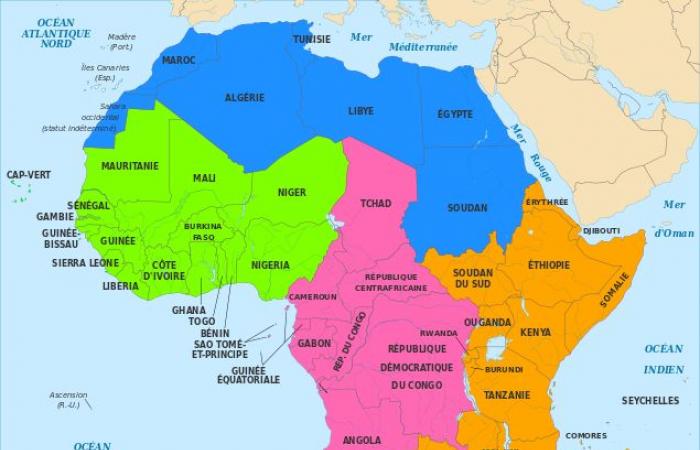Africa covers 30.353 million km2 for a population at the end of 2023 of approximately 1.4 billion inhabitants, 18% of the world population with a GDP in 2023 estimated at 2700 billion dollars against 2500 in 2022, approximately 2.7% of the world GDP, the equivalent of that of France which has a population of 68 million inhabitants,
University professor, Abderrahmane MEBTOUL was President of the National Council of Privatizations with the rank of Minister Delegate from 1996 to 1999.
A new governance led by African leaders is possible in order to regenerate Africa with the main objective of fighting inequalities and placing African countries, both individually and collectively, on the path to sustainable growth and development. Without being exhaustive, the priorities can be articulated around ten interdependent axes
first of all accelerate the African Continental Free Trade Area (AfCFTA) adopted on January 1, 2021, with 54 African countries having signed and 47 ratified, which according to the World Bank could enable African countries to lift 30 million people out of extreme poverty and increase the income of 68 million others who live on less than $5.50 a day. and on Of the $450 billion in potential gains, about $300 billion would come from trade facilitation measures aimed at removing bureaucratic barriers and simplifying customs procedures. The agreement is expected to reduce tariffs among member countries and will address policy issues including trade facilitation and services, while also encompassing regulatory provisions such as health standards and technical barriers to trade. If fully implemented, the AfCFTA would reorganize the region’s markets and economies and boost production in the services, manufacturing and natural resources sectors. Sub-regional integration through the creation of a common market for goods and services will strengthen the continent’s economic complementarity, boost intra-African trade by 52.3% by 2025, increase Africa’s income to $450 billion by 2035, and lift 30 million Africans out of extreme poverty.
secondly, establish favourable conditions for development by ensuring regional security without which no development is possible et pillar of Africa’s development, accelerating reforms while preserving social cohesion through a global policy synchronizing economic efficiency and deep social justice in order to gain the support of the populations, assuming deep morality of the leaders,
thirdlyt, given these high risks, significant financial resources, estimated by the Climate Policy Initiative at 2,800 billion dollars between 2020 and 2030, will be necessary for Africa to achieve its objectives in the fight against global warming. This is linked to the development of renewable energies (solar, green, blue, white hydrogen), the continent having significant potential since it concentrates around 60% of the world’s solar potential and 40% of the strategic minerals necessary for decarbonization;
Fourth, related to the objective previous the development of agriculture, which employs more than 50% of the active population and represents more than 25% of its GDP, must constitute where Africa, faced with the dramatic consequences of climate change, risks experiencing a 20% drop in its agricultural yields by 2050.
fifthly13 African countries are experiencing severe water insecurity. Based on the findings of the 2023 Global Water Security Assessment, these countries include Ethiopia, Eritrea, Comoros, Chad, Madagascar, Libya, Djibouti, Liberia, Niger, Sudan, South Sudan, Somalia and Sierra Leone. Another report states that on a scale of 1 to 100, 19 African countries have water levels below the threshold of 45. The same report suggests that only 13 African countries have at least a modest level of water security, including Tunisia, Botswana, Egypt, Gabon and Mauritius. Water being a 21st century issue, with risks of war and conflict as evidenced by the tensions between Egypt and Ethiopia over the famous Al Renaissance Dam, but this concerns all continents, faced with the decrease in water supply in Africa and the water shortage that threatens to hit Africa, there are two main innovative solutions: desalination and water reuse;
sixthly, strengthen investments, particularly foreign ones, by improving the business climate but within a framework of a win-win partnership, avoiding the squandering of wealth as in the past, where according to the United Nations Conference on Trade and Development (UNCTAD), 45 billion dollars of foreign direct investment flows were directed towards Africa in 2022, the year of the pandemic, i.e. 35 billion dollars less than in 2021 and this in parallel, the fight against capital flight linked to corruption, the French daily les Echos.fr, of 09/29/2020 estimating an illicit flight of 85/100 billion dollars per year ;
seventhly, The objective is to promote the diversification of production and exports, including the promotion of agro-industry, factories, mines, mineral profiles, tourism with the realization of investments in fundamental sectors likely to contribute to economic growth. Africa must invest in new technologies including artificial intelligence, the continent experiencing a significant deficit in digital According to a report by the World Bank and the United Nations, the digital economy in global GDP will reach 25% in 2026, more than 30% by 2030 against less than 15.% in 2016 should be an imperative for African leaders, the International Telecommunication Union estimating that a gain of 10% of its deployment on the territories of the continent would generate an increase of 2.5% of GDP per capita. According to a survey conducted by Africa24, the realization of the vision of a digital Africa requires the development of local digital solutions. The continent has only seven unicorn startups, i.e. technology companies with a value of more than $1 billion. To grow, Africa plans to develop its digital economy and invest in promoting local startups. The African digital economy is expected to be worth $712 billion (€680 billion) by 2050, or 8.5% of the continent’s GDP;
eighthly; it’s about to give priority to human development, particularly health, education, science and technology and skills development and combat the brain drain where according to the African Development Bank, 2022 report, Africa loses about $2 billion per year due to the brain drain in the health sector alone. However, it is an indirect flight of capital being the biggest hemorrhage, a country without its elite being like a body without a soul, the departure of graduates impoverishing the countries of origin: cost of their training, loss of skills and obstacles to development which refers to the consideration of knowledge, the African diaspora with its experience must be integrated;
ninthly, Africa is facing a important infrastructure deficit, accelerated by a growth in the urbanization rate, 50% of its territory, according to the latest findings of the review and update of Africapolis 2023 data, where for example (UN report) with significant disparities, 12 African countries displaying an electrification rate between 80/90%, 23 an average of 50% With a general average for the continent of 32% The financing requirement would be between 68 and 108 billion dollars across the continent according to the Ecofin agency, while according to the African Development Bank the amount would exceed 150 billion dollars, which would influence the growth rate by at least 2%;
tenthly, while ensuring good political, economic and corporate governance, with an emphasis on internal public financial management, negotiations with the main donors are required to alleviate the debt that is becoming unbearable. According to the IMF, public debt in Africa reached $1,800 billion at the end of 2022, an increase of 183% since 2010. Added to this are the impacts of global warming which are hitting Africa hard, which is nevertheless responsible for less than 5% of greenhouse gases according to UN reports and according to the UN, Africa needs nearly $200 billion by 2030 to achieve its SDGs.
In conclusion, as Nicolas Normand notes in a contribution dated February 15, 2021 in Magazine/Diplomatie, “will Africa in 2050 be able to become Europe’s new frontier, its growth relay or, on the contrary, the source of its main threats, the shore from which incessant waves of immigrants fleeing the unbearable will surge? ». Having for decades an optimistic vision of the future of Africa thanks to its dynamic youth and a renewal of its governance (see conference Pr Abderrahmane Mebtoul conference Unesco 1992 cooperation Europe/Africa), let us avoid “Afro-pessimism” because according to the IMF Africa with a growth rate higher than 5/7% over the next three decades, will have the potential to contribute to the world economy to the tune of 29,000 billion dollars in 2050 including more than 4,500 billion dollars for sub-Saharan Africa, where according to Euromonitor forecasts, between 2023 and 2040, the real GDP of East Africa should increase by 193%, a rate significantly higher than that of Central Africa (+10%). Generally speaking, in anticipation of major geostrategic and global socio-economic upheavals 2024/2030/2040/2050, the new challenges for Africa concern economic recovery taking into account global technological upheaval, water resources, poverty, epidemics, and the environment. They are local, regional and global. It is becoming imperative that African governments improve their governance and for developed and emerging countries that a strictly commercial vision is replaced by co-development for shared wealth. Dialogue of civilizations and tolerance are elements that are more necessary than ever for cohabitation between peoples and Nations.






